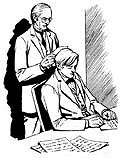Fifth Estate staffer, playwright, and madcap prankster, the late Pat Halley, once wrote in these pages, “The purpose of education is to kick the animal out of you.” That is, to make individuals conform to a society based on constraint of one’s desires and autonomy. This is true to one degree or another of every culture although within the modern state and capitalist social order, this is carried out to the extreme by the necessities of their definitions.
Every society seeks to reproduce itself by inculcating into its next generation its fundamental values and version of reality.

In one such as ours, where everything that it means to be human has been grotesquely twisted to the needs of the ruling order, formal education teaches unquestioning respect for authority, acceptance of hierarchies, carrying out tasks that benefit others but harm yourself and the planet, adherence to work in which you have no interest, measurement in abstractions, militarism and nationalism, an inherent value in the production and consumption of commodities, religious mysticism, and, perhaps the most insidious, that the current system is the only possible manner in which the world can be constructed.
This is what is taught in the best of schools. However, capitalism’s trajectory increasingly has less need for a mass educated, compliant workforce as it did when public education was initiated in the 19th century.
Jobs disappear never to return, so schools in the classes beneath the middle become warehouses for the poor and near-poor designed to keep students off the streets, out of the shrinking workforce, and hopefully mold them into a passive population which won’t object to their fate.
At the same time, we recognize and salute the many radical public school teachers who subvert their assigned mission by teaching a questioning of authority and received knowledge.
The essays in this section look at the nature of schools and what alternatives are available to those who won’t accept these definitions for their children or communities. This is only an opening to the conversation about radical perspectives on education.
We welcome your comments on our Letters page.
